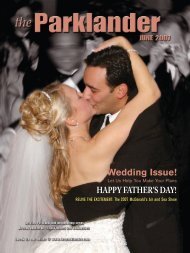February 2008 - The Parklander Magazine
February 2008 - The Parklander Magazine
February 2008 - The Parklander Magazine
- No tags were found...
Create successful ePaper yourself
Turn your PDF publications into a flip-book with our unique Google optimized e-Paper software.
WATCH YOUR LANGUAGEDo you Speak to Express or Impress?By Bill JohnsonDo you speak to express ideas or to impress people? Are you too verbose? Today, too many people use too many wordsand too many big words to express themselves. <strong>The</strong>y speak to impress their listener, rather than to communicate effectively.<strong>The</strong>y speak to “impress” rather than to “express.” People seem to think that bigger words and unnecessary words makethem somehow sound smarter.DHave you ever noticed, that no one takes “medicine” anymore? Now,everyone takes “medication.” My parents took medicine and no onequestioned the use of the word back then. I wonder, how and why does aperfectly good word like “medicine,” get inflated by one syllable? Was“medicine” not good enough? Is “medication” a better word? Did we reallyneed a new one? This small example reflects the epidemic of verbosity thathas swept our nation.Have you noticed that people are always “in the process” of doingsomething? A neighbor who’s painting his house will not tell you, “I’mpainting my house.” No chance. He’ll tell you,“I’m in the process of paintingmy house.” No one’s simply just buying a car or applying for collegeanymore. <strong>The</strong>y’re “in the process” of buying a car or “in the process” ofapplying for college.In law enforcement and government agencies, no one is just “investigating”something. Not today. Now they are usually “in the process of investigating.”Maybe they are “conducting an on-going investigation.” If it’svery important, I suppose, that they are “in the process of conducting aninvestigation.” Under no circumstances, though, would they be caughtsimply “investigating” the local corruption or Mrs. Smith’s murder.ambitious to simply want to “make a positive change.” Why “make” achange when you can “impact” one or “affect” one?This inflation of the English language is not confined to the U.S. but affectsothers who speak English. <strong>The</strong> President of Pakistan commenting on hisrelationship with the U.S., recently said, “We have an acute trust deficit.” Itmight take a second or two for the meaning to become clear. Surely, it wouldhave been clearer if he had just said,“We don’t trust each other.”<strong>The</strong> U.S. Ambassador to Iraq testified before Congress recently. Heinformed us “ethno-sectarian groups are engaged in competition for powerand share of resources.” Being “engaged in competition for power” mustsound more intelligent or sophisticated than “fighting for power.”Criticism of inflated language seems petty. Most often its pompositydoesn’t make any difference. But occasionally it does. But there canactually be real danger in not communicating clearly. For example, a newwarning on a prescription drug label tells us a drug (or should I say“medication”), may be associated with “myocardial ischemic events such asangina or myocardial infarction.” Simply put, the drug causes chest painsand heart attacks. Maybe the drug companies don’t want the consumer toknow this.A corporate CEO tells us that his company “is in expansionmode.” I guess it would be demeaning to him to say hisbusiness was just “growing”, or, simply, just “expanding.”Have you noticed now that the professionals you know don’t just have“skills” anymore? No, no. <strong>The</strong>y have “skill sets.” Perhaps someone with“skill sets” must be more valuable to the company than someone who onlyhas “skills.” Perhaps having a “skill set” helps impress the boss atpromotion time.A corporate CEO tells us that his company “is in expansion mode.” Iguess it would be demeaning to him to say his business was just “growing”,or, simply, just “expanding.”<strong>The</strong>se days, in the corporate world, you don’t just “support” someone’s idea.You must be “supportive of it.”Telling a colleague “the CEO is supportive ofmy idea” is apparently more impressive than,“the CEO supports my idea.”A local candidate for sheriff told us he wants “to be able to impact thecommunity and affect a positive change.” I guess it would be lessSometimes inflated language causes confusion, as it did in the ‘70s duringthe congressional Watergate hearings to impeach President Nixon. Nixon’slawyer, John Dean, testified that certain events took place “subsequent to” hisconversation with the White House chief of staff. <strong>The</strong> sequence of eventscaused confusion for the committee as it tried to establish a timeline ofevents. It turned out that Dean thought “subsequent to” meant “before”instead of “after.” <strong>The</strong> confusion would have been avoided if he had simplysaid a certain meeting took place “before” another meeting. Do you supposethat Dean thought he sounded more intelligent by using “subsequent” ratherthan “before?” Was he speaking to impress or to express?And how’s your speech these days?Bill Johnson is a freelance writer and partner in Treehouse Studios, agraphic design and communication’s firm in Coconut Creek. Email him atjohnson@theparklander.com.112 FEBRUARY <strong>2008</strong>
















